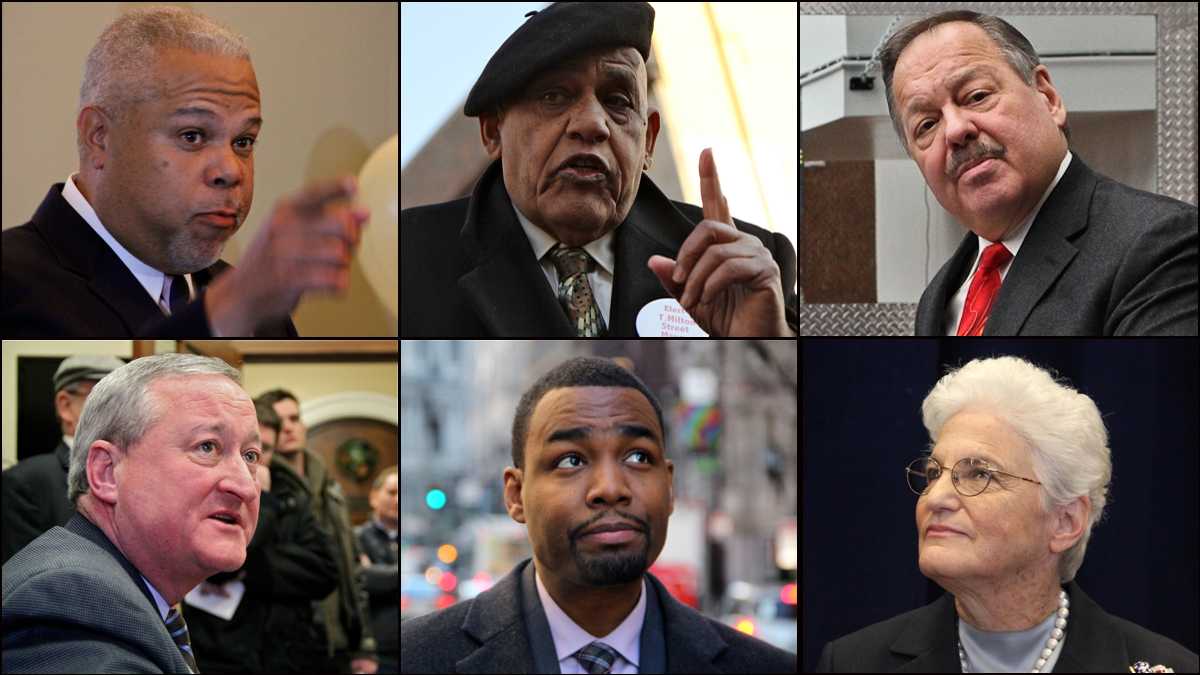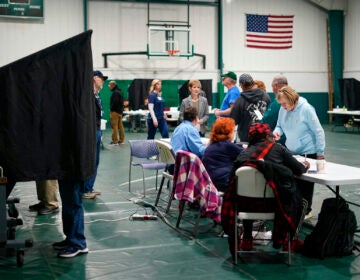Which of these Philly mayoral candidates will best improve city schools?
Listen
(Clockwise from left) Philadelphia mayoral candidates, Senator Anthony Hardy Williams, Milton Street, Nelson Diaz, Jim Kenney, Doug Oliver, and Lynne Abraham (NewsWorks file photos)
Philadelphia’s future depends in large part on developing a public school system that can serve the city’s large economically disadvantaged population while attracting middle-class families that will expand its tax base.
So, for good reason, education has been the forefront issue in this year’s mayor’s race.
This year’s candidates for the Democratic primary are: state Sen. Anthony Williams, former city councilman Jim Kenney, former city district attorney Lynne Abraham, former common pleas court judge Nelson Diaz, former state Sen and convicted tax evader Milton Street, and former Philadelphia Gas Works executive Doug Oliver.
Each has spoken voluminously about what he or she can do to improve the city’s schools.
But there’s often a chasm between what candidates say on the campaign trail and the realities of what a mayor can accomplish.
There’s a few concrete things to zero in on.
1) A mayor can propose ways to find new city revenue for schools
This can be either through tax increases, better collection of existing taxes, savings within city departments or reductions to services.
Current Mayor Michael Nutter has a plan to raise more education funding by hiking city property taxes by 9.4 percent.
This would generate $105 million in stable, recurring revenue to city schools. Philadelphia School District leaders are very enthusiastic about the prospect of this passing — saying this in combination with Gov. Tom Wolf’s proposals would help them return the classroom resources that have been stripped in recent years.
At a mayor’s forum I moderated recently at Childs Elementary in South Philly, I asked the candidates if they supported that plan.
Each gave a resounding, ‘no.’
Abraham was not in attendance, but she also doesn’t support the tax hike.
So what are the candidates proposing?
Nothing that nears the sort of silver-bullet cash influx that would come with Nutter’s plan.
Each candidate has a hodge-podge of measures to come up with the $103 million in additional recurring funding from the school district. In many cases they rely heavily on the idea that more money can be found by creating a more efficient government that’s more aggressive about collecting existing taxes.
If elected, Kenney expects to find $50 million in savings in his first year that would come by making cuts to existing city agencies and reforming the process by which the city contracts with vendors.
Williams says he’d ask city council to explore giving a greater share of property tax revenue to schools. He is also banking on a $50 million infusion from the Philadelphia School Partnership — the sort of general, deficit-reducing grant that runs in direct opposition to PSP’s mission. It typically gives money for specific programs or to help certain schools expand.
Nelson Diaz has stressed the idea that the city should place more of a tax burden on commercial property — an idea that would require amending the state constitution.
He’d also keep bars open 24 hours in a designated zone in Center City. Doug Oliver, too, has talked about raising education dollars by keeping bars open later. This idea, too, would require the cooperation of the state legislature.
Advocating for his property tax plan, Mayor Nutter has called these ideas “bogus.”
On Tuesday, Nutter deployed his finance director, Rob Dubow, to explain in detail the shortcomings of each pitch. In short, the Nutter camp says the ideas are too little, too late, too reliant Harrisburg, or too crippling to the rest of the city budget.
Read that analysis here.
Bottom line: the school district is far more enthusiastic about Nutter’s idea than anything being presented by the candidates.
2) The mayor can press state lawmakers for additional education funding
The candidates have spent much of their time listing reasons why they would be the city’s best ambassador.
Each is on the same page with Gov. Tom Wolf in that they a) all want more state education aid, b) want to see a fair-funding formula implemented, and c) all want to bring back the line-item that helps defray the added costs of charter schools.
Who’s Gov. Wolf’s preferred candidate?
So the real question becomes: Who can actually best work with the Republican-dominated state legislature?
State Sen. Williams is probably at the top of the list.
He’s been in Harrisburg for decades, and Republican leaders have a respect for him. They don’t see him as a liberal partisan, and say his track-record fighting for school choice gives him a lot of credibility.
But that’s not to say that he’s the darling of the right-wing. Some of his actions on issues not related to schools have earned him enemies in high places there.
Williams, himself, has made his ability to generate more education funding for Philadelphia a cornerstone of his campaign. He specifically cites that he sponsored the enabling legislation that created Philadelphia’s cigarette tax and made permanent the city’s 8-percent sales tax.
To be fair, as a city councilman, Kenney also voted for those bills, but there is a big difference between getting something through City Hall and pushing it through the often slow-moving gears of the state capitol, and Williams deserves credit for helping to make that happen.
Some in Harrisburg do know and respect Jim Kenney, but many conservatives in leadership see him — and this is a bad thing in their eyes — as a typical big city liberal.
Lynne Abraham racks up points among state Republicans based on her law and order background, though that goodwill may not last long. Abraham says she’s willing to file a federal lawsuit against the state for not providing its “fair share of education dollars.”
Doug Oliver has stressed his ability to understand city issues from the perspectives of rural lawmakers, but he remains an unknown to most.
3) The mayor can appoint two members to the Philadelphia School Reform Commission.
But this wouldn’t happen right away. Mayor Nutter’s two appointees can serve out the course of their terms before being replaced.
Nelson Diaz has routinely talked about dissolving the School Reform Commission, but, as mayor, he’d have no power to do that.
The five-member SRC panel either votes to end itself, or state lawmakers could repeal the law that put the SRC in place to begin with.
At best, Diaz could eventually appoint two members who’d be ready-and-willing to hit the self-destruct button.
Williams has said that he’d appoint a parent and an educator to the panel. Both would likely be very open to school choice and the expansion of the charter sector. Williams is backed in the race by a trio of wealthy proponents of charters and vouchers.
Kenney’s picks would likely be closely allied with the interests of the traditional public schools — commissioners who’d be more sympathetic with the views of the teachers’ union, then, say, current commissioner Bill Green, a longtime Kenney adversary.
Kenney is backed in the race by the city’s most powerful and politically engaged unions, including teachers. Kenney also served on the board of Independence Charter School.
4) The mayor can set the tone for the city’s conversation about public education
Milton Street has made anti-violence the centerpiece of his campaign. He’s also been the most critical of the city’s charter sector.
Nelson Diaz routinely says that the mayor should assume more direct responsibility for school performance.
Anthony Williams, Lynne Abraham and Doug Oliver have been saying that, first and foremost, the tension between district schools and charter schools needs to stop.
Both Williams and Abraham have founded charter schools. Williams in West Philly; Abraham in Reading. Here was Abraham at a debate held by students last month at Central High School.
Kenney wants to take a much more active role in working with district principals. He says he’ll be in constant dialogue with principals about how he can utilize other city agencies to add extra support to the schools.
Here was Kenney fielding questions recently from the student government at Julia de Burgos elementary in Fairhill.
Like the other candidates, Kenney places emphasis on the importance of universal pre-K. He hopes to open more high quality pre-K options within underutilized district schools.
Oliver, too, is hoping that synergy between city agencies and schools will provide better opportunities for children.
Abraham wants to rehab the aging infrastructure of the city’s schools — emphasizing technological upgrades and green energy improvements.
Wild Card?
With the backing of major donors, Anthony Williams and Jim Kenney have been the only candidates thus far who have been bolstered by television advertisements — making their visibility significantly higher than the other candidates.
At this point, it seems the race is theirs to win or lose.
But if there’s a wild card on the education front it’s this: Voter turnout among the youth isn’t expected to be large, but if that demographic exceeds expectations, it could throw a wrench into projections.
At the forum at Central, students were most enthusiastic about the candidates who haven’t been dominating television advertisements — the space where many older voters often learn the most about candidates.
The students liked Nelson Diaz, Milton Street, and seemed especially fond of Doug Oliver, the youngest democrat in the race.
“He’s reaching out, not just to the students and people our age, but everybody out there,” said senior Adriana Hudson, 18, of Oliver.
The primary will be held on Tuesday, May 19.
WHYY is your source for fact-based, in-depth journalism and information. As a nonprofit organization, we rely on financial support from readers like you. Please give today.





